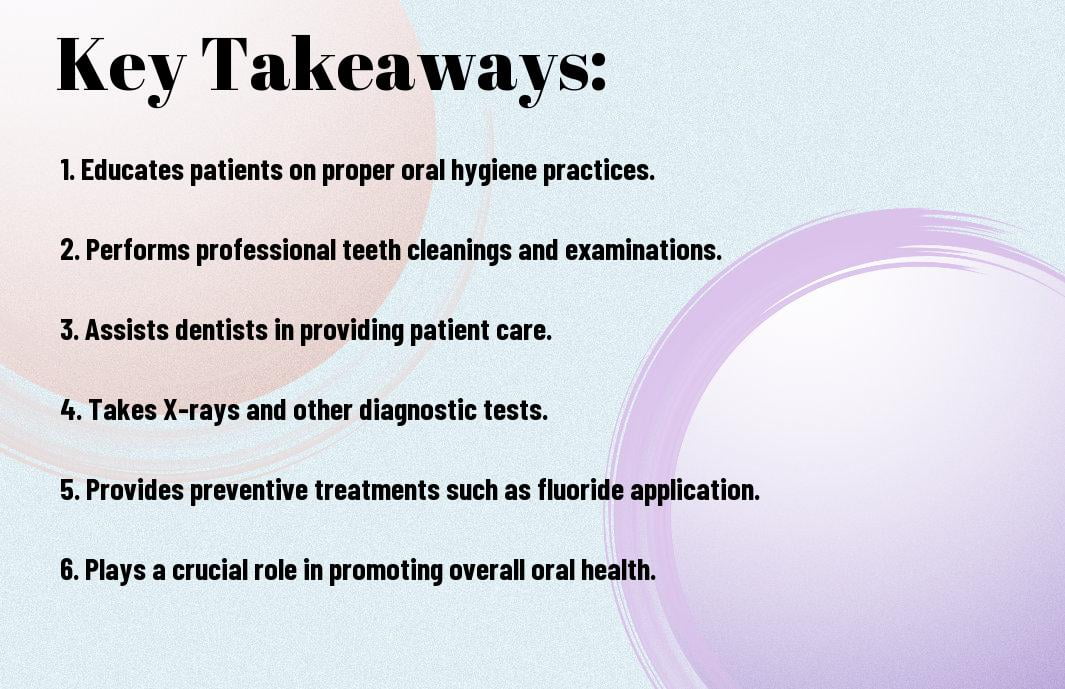Have you ever wondered about the importance of a dental hygienist in maintaining your oral health? Dental hygienists play a crucial role in not only keeping your teeth clean and healthy, but also in preventing dangerous oral health issues. When you visit a dental hygienist, they will thoroughly clean your teeth, remove plaque and tartar buildup, and educate you on proper oral hygiene practices. They also perform important screenings for signs of oral diseases such as gum disease and oral cancer. By regularly seeing a dental hygienist, you can positively impact your overall oral health and potentially prevent serious problems from developing. In this blog post, we will explore the vital role that dental hygienists play in maintaining your oral health.
Key Takeaways:
- Preventive Care: Dental hygienists play a crucial role in educating patients on proper oral hygiene techniques and providing preventive treatments, such as cleanings and fluoride applications, to help maintain oral health.
- Disease Detection: Dental hygienists are trained to examine the oral cavity for signs of gum disease, oral cancer, and other oral health issues, making early detection and treatment possible.
- Patient Advocacy: As patient advocates, dental hygienists promote the importance of good oral health practices and work collaboratively with dentists to develop personalized treatment plans for each patient.
- Lifestyle Counseling: Dental hygienists offer guidance on dietary habits, tobacco cessation, and other lifestyle factors that can impact oral health, emphasizing the importance of a holistic approach to maintaining overall well-being.
- Continuing Education: Dental hygienists are committed to staying informed about the latest advancements in dental technology and treatment protocols, allowing them to provide the best possible care for their patients.
Educational and Professional Requirements of Dental Hygienists
Any aspiring dental hygienist must meet specific educational and professional requirements in order to practice in the field. These requirements are put in place to ensure that dental hygienists have the necessary knowledge and skills to provide quality oral care to patients.
Required Education and Training
In order to become a dental hygienist, you must first complete a dental hygiene program accredited by the Commission on Dental Accreditation (CODA). These programs are typically offered at community colleges, technical schools, or universities and typically take about 3 years to complete. During your education, you will receive training in dental anatomy, radiography, periodontology, and other essential skills needed to perform dental cleanings and assist dentists in various procedures. Additionally, you will also undergo supervised clinical practice to gain hands-on experience in a dental setting.
Licensing and Continuing Education
Once you have completed your dental hygiene program, you must obtain a state license to practice as a dental hygienist. This involves passing both written and clinical examinations to demonstrate your knowledge and abilities. It is important to note that licensing requirements can vary by state, so be sure to familiarize yourself with the specific requirements in your state. Additionally, in order to maintain your license, you will need to participate in continuing education courses to stay updated on the latest advancements and best practices in dental hygiene. This is crucial for ensuring that you are providing the best possible care to your patients.
The Dental Hygienist’s Responsibilities
For a dental hygienist, your responsibilities are crucial in maintaining the oral health of patients. You play a key role in providing preventative oral care and educating patients on proper oral hygiene practices. Your expertise in dental hygiene is essential in helping patients achieve and maintain healthy smiles.
Conducting Oral Assessments
As a dental hygienist, one of your primary responsibilities is to conduct thorough oral assessments. This includes examining the teeth and gums, checking for signs of gum disease, cavities, and other oral health issues. You also perform screenings for oral cancer, providing early detection and intervention. By identifying potential problems early on, you can help prevent more serious oral health issues from developing.
Preventive Dental Care Services
Another important responsibility of a dental hygienist is providing preventive dental care services. This includes performing professional dental cleanings to remove plaque and tartar buildup, which can lead to tooth decay and gum disease. You also apply fluoride treatments and dental sealants to protect teeth from decay. Additionally, you educate patients on proper brushing and flossing techniques, as well as provide guidance on maintaining a healthy diet for optimal oral health.
Advanced Roles and Specializations
To further your career as a dental hygienist, you can choose to specialize in various advanced roles. This can include becoming an oral health educator, public health hygienist, research hygienist, or even a corporate hygienist. By taking on these specialized roles, you can expand your skill set and make a significant impact in the field of dentistry. You can also pursue further education to become a dental therapist, allowing you to perform additional dental procedures under the supervision of a dentist. For more information on the advanced roles and specializations of a dental hygienist, you can visit The Role of Dental Hygienist in Maintaining Good Oral Health.
| Advanced Roles | Specializations |
| Oral Health Educator | Public Health Hygienist |
| Research Hygienist | Corporate Hygienist |
| Dental Therapist | Additional Dental Procedures |
Periodontal Therapy
Periodontal therapy is a crucial aspect of dental hygiene that focuses on the treatment of gum diseases. As a dental hygienist, you play a vital role in educating patients about the importance of proper oral hygiene and conducting thorough cleanings to prevent and treat periodontal disease. You also assist in performing non-surgical periodontal treatments, such as scaling and root planing, to help patients maintain healthy gums and prevent further progression of periodontal disease.
Pediatric Dental Hygiene
When working with pediatric patients, it’s essential to tailor your approach to meet their specific needs. As a pediatric dental hygienist, you have the opportunity to make a positive impact on children’s oral health by educating them on proper dental care and providing preventive treatments. You also play a crucial role in creating a comfortable and welcoming environment to ensure children feel at ease during their dental visits. This allows you to establish a foundation for lifelong oral health habits in young patients.
Working Interprofessionally
Not only do dental hygienists work directly with patients, but they also play a crucial role in collaborating with other health professionals to ensure overall oral health is maintained. This interprofessional approach is essential in providing comprehensive care for patients.
Collaboration with Dentists and Other Health Professionals
When working with dentists and other health professionals, you play a vital role in advocating for your patients’ oral health needs. It’s important to communicate effectively with dentists, physicians, and other healthcare providers to ensure a holistic approach to patient care. This collaboration ensures that all aspects of a patient’s health are considered when creating a treatment plan. Your expertise in preventive care and patient education can greatly benefit the overall well-being of your patients.
Educating Patients on Oral Health Best Practices
As a dental hygienist, you have the opportunity to educate and empower your patients to take charge of their oral health. By providing them with the knowledge and tools to maintain a healthy smile, you help prevent serious oral health issues from developing. You play a key role in teaching patients about proper oral hygiene practices, the importance of regular dental visits, and the impact of diet on oral health. Your guidance can lead to improved oral health outcomes and overall well-being for your patients.
Challenges and Opportunities in Dental Hygiene
Now, let’s take a closer look at the challenges and opportunities that exist in the field of dental hygiene. As a dental hygienist, you play a crucial role in maintaining the oral health of your patients. However, there are certain challenges that you may encounter in your practice, as well as opportunities to make a positive impact on the overall oral health of your community.
Addressing Access to Care
One of the most pressing challenges in dental hygiene is ensuring that all individuals have access to quality oral health care. You may encounter patients who lack the financial means to seek regular dental care, leading to untreated dental issues and potential health risks. It is important for you to advocate for policies and programs that promote accessibility to dental care for all. By participating in community outreach programs and supporting initiatives that aim to provide dental care to underserved populations, you can make a significant impact on the oral health of your community.
Embracing Technological Advances in Dental Care
Advancements in dental technology present significant opportunities for improving the quality of care you provide to your patients. From digital imaging and diagnostic tools to minimally invasive treatment options, technological advances in dental care allow you to deliver more precise and effective treatments. Embracing these innovations can enhance the patient experience and contribute to better oral health outcomes. By staying updated on the latest technological developments in the field, you can position yourself as a knowledgeable and progressive dental hygienist, ultimately benefiting your patients and practice.
Conclusion: The Role Of A Dental Hygienist In Maintaining Oral Health
Conclusively, the role of a dental hygienist in maintaining your oral health cannot be understated. With their expertise in oral hygiene and disease prevention, dental hygienists play a crucial role in helping you maintain a healthy smile. Through regular cleanings, professional advice on proper oral care techniques, and early detection of oral health issues, dental hygienists help you prevent dental problems and maintain a healthy mouth. By following their recommendations and maintaining regular dental visits, you can ensure that your oral health is in good hands and be on your way to a healthy, beautiful smile.
FAQ
Q: What is the role of a dental hygienist in maintaining oral health?
A: Dental hygienists play a crucial role in maintaining oral health by educating patients on proper oral hygiene practices, conducting professional cleanings to remove plaque and tartar, taking X-rays, and assessing the overall oral health of patients. They also assist dentists in treatments, such as applying fluoride and sealants, and provide tailored oral care plans for patients.
Q: Why is regular dental hygiene important for overall health?
A: Regular dental hygiene is important for overall health because it helps prevent oral diseases such as cavities, gum disease, and bad breath. Furthermore, oral health is linked to systemic health, with research suggesting that poor oral health can contribute to conditions such as heart disease, diabetes, and respiratory infections. By maintaining good oral hygiene, individuals can reduce the risk of these health issues and improve their overall well-being.
Q: What qualifications and training are required to become a dental hygienist?
A: To become a dental hygienist, individuals must complete a dental hygiene program accredited by the Commission on Dental Accreditation (CODA). This typically involves obtaining an associate degree or a bachelor’s degree in dental hygiene. Additionally, dental hygienists must be licensed in the state in which they practice, which typically involves passing national and state clinical board exams. Continuing education is also required to maintain licensure and stay current with advancements in the field.







